#I am not a native Chinese speaker
Text
[Caption: Liu Yuning livestreams for fans from a hot air balloon and scares himself]
LYN: My god. … It’s not too fast, that’s good.
I feel like my phone is going to fall.
So high?!?
That’s enough. (x5)
[LYN’s trademark high-pitched laugh]
[English] Oh my god!
What was I thinking? Oh, no no no no!
I’ve already broken down! (x4)
It’s OK (x5)
My legs are already numb! (x7)
[voice wobbling cartoonishly] I don’t know why… why did I go up here?
I’m fine.
I don’t dare let you guys see my legs, I’m afraid it’ll scare you.
[shows his legs dangling] Oh my god (x2)
Spending money to be punished. That’s about enough, if I stay longer my pants will be wet. Oiyoooo…
I feel like a monkey, look, so many people are watching and filming me, am I a monkey?
[off the balloon]
My legs are weak.
[0.005 seconds later]
I’m not scared at all, I feel like that was fine. It wasn’t that scary.
[Caption: It wasn’t scary but you yelled “my legs are numb” 7 times]
#liu yuning#刘宇宁#he's so funny#I am not a native Chinese speaker#always feel free to correct my translations
3 notes
·
View notes
Text
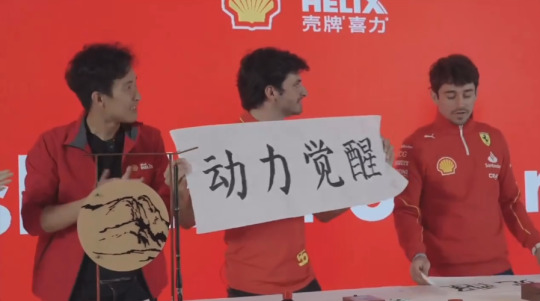
As a Chinese person from Hong Kong I'm going to officially say this absolutely blows my mind. Here's why.
In the video, Charles and Carlos were plainly copying calligraphy stroke-by-stroke from a large image in front of them. What makes Carlos' attempt so impressive is that he's effectively gotten nearly all the proportions, starting and ending brush pressures and tail-offs, and the structure right. It's not perfect. But it's damn well near perfect.
Compare it to Charles': Charles didn't do a bad job at all, and has successfully copied many of the requisite features, but he has seen each stroke as a line, as many people who write Chinese characters with ballpoint pens do nowadays - point A to point B, with natural loss of shape and flow in between. It's not necessarily a problem. Charles is writing the characters. But interestingly, Carlos isn't writing at all.
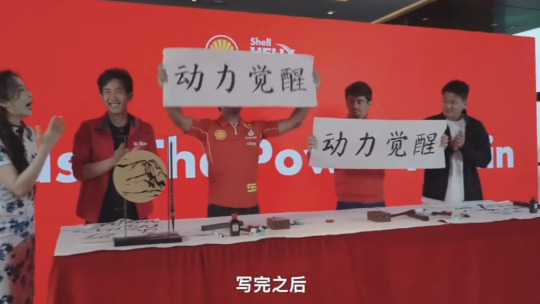
On rewinding the video you see why Carlos' was shaped so perfectly. He doesn't know Chinese. He doesn't know anything about stroke order, or speed. But he knows detail.
If you look at his hands as he writes he separated each stroke into a shape. Then he did his level best to recreate each shape as carefully as he could by pressing the brush until he could see it formed the right thickness of the line.
He didn't write, like Charles did. He painted.
If this is how good Carlos is at copying a language he does not know I wonder how amazing he would be at painting if he actually spent time to learn.
#For reference I and a lot of other native Chinese dialect speakers and writers do what charles did#we process the characters as words and the strokes as components of that word and sacrifice specific brushtroke shape#it's one of the first things you have to de-learn if you didn't do calligraphy as a child#seriously as a Chinese person from Hong Kong this is the hottest thing Carlos Sainz has ever done I'm in love#f1#carlos sainz#charles leclerc#charlos#chinese gp 2024#my post#I AM YELLING OK#A recurrent mistake that Carlos made was the angle and continuity of the 2nd stroke of 力#that's his only obvious mistake#but the 觉 blows my mind#and the FREAKING LAST STROKE OF THE 星 RADICAL#HOW HE COPIED THE THIN CURVE OF THE FINAL HORIZONTAL STROKE#I AM LOSING IT AT 1:50 AM ON A TUESDAY MARRY ME
240 notes
·
View notes
Note
not a correction, just wanted to say thank you for organizing this blog so well. when i read svsss, it was neither the first EN fantranslation nor the original CN, so when i started interacting with the new western fandom, i was like what the hell is everyone talking about and referencing? turns out i had practically read an entirely different story and a lot of the 'facts' i thought i knew about svsss were wrong. good luck and be careful on your way. regarding so many languages it can be easy to step on other people's feelings without meaning to.
You're welcome! I do my best to be as thorough as I can.
The fact that there were fanTLs of earlier versions of the original SVSSS and the official TL being translated from the revised edition have caused quite a few of the misinterpretations I've encountered, in addition to the translations themselves having quirks. Of course, this is not meant to disparage the translators! Translation is something very difficult to do (at least, I find it very difficult), and it's hard enough to carry the meaning for someone who knows both the target and the source language, but even more difficult to translate the meaning for someone with no knowledge of the original language at all. Once you know something and are aware of it, the brain will often forget how it feels like not to know-- and for a translator with knowledge of both the source and target language, some details might be missed when translating since it's assumed to be common knowledge.
SVSSS isn't written with a western audience in mind, and there are a lot of in-jokes and the like related to specifically CNovel genre tropes and internet culture. These things don't need to be explained to CN readers, since it's common knowledge-- but to western readers it flies right over their heads, sometimes to the point where they don't even know there's something to read into. This goes for TL's in general, but especially where it has to do with modern everyday life and culture.
A personal and specific example of this would be, I study, sew, and collect Hanfu. When historical clothing is depicted or described, a simple visual description will tell me additional details about the character/time period/etc. without having to state anything more. This just happens naturally, and my mind will take it as something obvious-- meanwhile, someone who has not studied Hanfu won't necessarily see anything beyond the physical depiction. Still, those additional details and meanings aren't always easy to put into words in any sort of concise way, so it's hard to explain why to someone without that knowledge.
Like you, I also hadn't read the original fan translations. The first version I read was 7Seas Official TL, the second was the original CN version (not revised, as I had yet to find a site that hosted the revised version). To this day, I still wonder where some common fandom ideas originate from, and have found quite a few that come from these original fantranslations. Currently, I have EPUBs of the Revised CN and 7S TL, and those are what I use to write my analyses-- since I'm unfamiliar with the original fantranslations, I do rely on my followers quite a bit to provide quotes from those where necessary, as I can't jump to finding the quote in a copy as quickly as I can with the versions I have as EPUB.
This blog is, of course, particularly concerned with western EN fandom, as it is the only fandom I have any familiarity with (sadly, living in the USA makes it so I'm virtually locked out of cnet), and the EN translations-- I have little to no knowledge whatsoever about Korean/Thai/Viet/etc. translations, as I don't know those languages. I'm sure that the fandoms in these languages also have their own set of misunderstandings and misconceptions, but I can't speak on that at all. I'm just here trying to correct as much of the widespread misinformation in the western EN fandom as I can, with what knowledge and tools I have.
In the end, even when there are such misconceptions arising from it, I still have a lot of respect for translators. Language is so much more than just words, and I know from experience how difficult it can be to take something from one to another.
#answered#as someone who was a native chinese speaker#who is now relearning after L1 attrition#and who has struggled with speaking primarily english in a chinese-speaking established mental framework#without fluency in my native language for many years#translation and linguistics are something i am very passionate about and interested in#so i'm sorry this got so long#i just had to hyperfixate a bit#faq
27 notes
·
View notes
Text
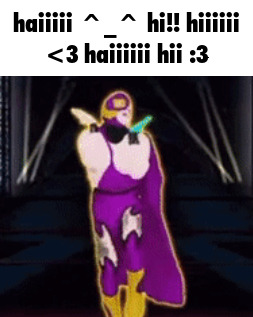
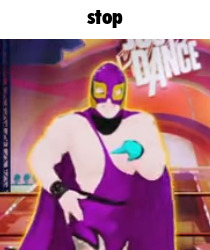
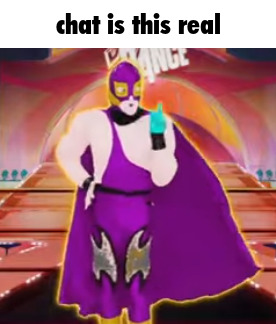
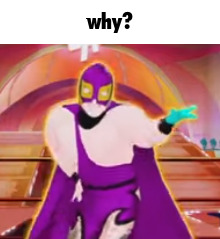
free to use dont need to credit me or whatever
#just dance#just dance 4#side note until he gets a canon name im calling him zise derived from 紫色 which is chinese for purple#please correct me if the translation is wrong! i am not a native chinese speaker#ill make a separate post with my hc names for some of the dancers
8 notes
·
View notes
Text
tripping balls as i am watching old mcyt videos
#/hyperbole but like#minecraft really did change over the years huh#when i was watching bdubs and generik's diversity 1 and 2 playthroughs i really couldn't shake off the feeling that i almost watched two#two guys from my childhood play a map that is somawhat familiar#except i am not native english speaker those two dudes were completelly different people#the two dudes i am talking about are mistik and lagger btw#but even if i dont feel that. man#it was different back then#i've got a glimpse on ( english ) old mcyt through bdub's old stuff#like the some of 1st season of building with bdoubleo obv#and then OOG and fly boys and survival of the fittest both seasons (??) and a bit of feed the beast and some older vods of his including the#the one with the 'chinese red' shirt#and now im watching zed's old stuff and now specifically i started watching moonlight from tangos pov because i was done with zed's pov in a#a day lol#and its not how people used to make videos either its the game itself#i couldnt expirience the java version for the longest time but i had some time in pocket edition#but now i csn just come to my pc and be able to play old versions of pc minecraft and just#anyway anyone want to play diversity maps with me at some point#mauv's meowing
3 notes
·
View notes
Text
NEON Carnival Q&A Pamphlet Translation
disclaimer: apparently Taiwanese Mandarin is different from what I speak, so some of these may need to be taken with a grain of salt! my credentials are that my native language is Cantonese and I know - but am rusty on - Mainland Mandarin.
Q: Do the characters have set dick sizes?
A: The team has a "super⭐secret measure", every time they draw the characters they'll reference it.
Q: Between Quincy and Olivine, who has the bigger breasts?
A: The team fought over this and couldn't decide, so there's no answer.
Q: I want to know the ages of the long lived ones, the yokai, and the familiars! Who's the oldest?
A: From oldest to youngest are: Kuya > Quincy > Rei > Aster > Morvay > Yakumo > Garu. The specifics of their ages will be revealed in the game.
Q: Who's older between Father and Topper?
A: Father is older than Topper!
Q: The game has a lot of retro stuff, super curious about the producer's age!
A: Retro has nothing to do with the producer's age!!!
Q: How are the kinks of each room thought up?
A: The devs think of them in the small dark room, the artbook sketches include clues.
[t/n: I consulted two other Chinese speakers and I'm still not really sure what the answer actually means, so this is a best guess translation.]
Q: What's inside the small dark room?
A: Tired and busy devs......
Q: When designing event outfits, how do you decide where to open holes?
A: Different people will think of the parts they want to highlight, later on we'll also test different levels of nakedness. (it's not like we haven't thought of throwing darts to decide)
[t/n: little unsure about this one too. it's possible it means they think of which part of the characters they want to highlight, but they used 眷屬 rather than 角色.]
EDIT: @milkeumilkeou has informed me that in the specific context of nuca, 眷屬 means clan members. that's what I get for not playing the game in Chinese... in this case, the better translation is:
A: Depending on the clan member the devs will open the holes at the places they want to highlight, later on they'll also test different levels of nakedness. (it's not like they haven't thought of throwing darts to decide)
Q: How were the voice actors chosen?
A: The producer chose them according to the characters' personalities and the desired voice. Many thanks to the voice actors!
Q: How far in advance do future events begin production?
A: Usually the topic is decided on about 4 - 6 months in advance, and then production begins.
Q: I want to know which character the devs think would be the best coworker!
A: Everyone agrees the best coworkers would be Eiden, Edmond and Olivine; Dante's work ability is also very strong, but he's more like a head that scares people.
[t/n: 'head' may also translate to director or manager.]
Q: Do the characters have body hair?
A: The devs actually really wanted to draw it, but considered various realistic reasons, so the players can't see body hair, but you're free to imagine it! (let Quincy have some stubble... how would that be?)
[t/n: I would guess that the 'realistic reasons' they considered are probably that BL typically doesn't feature body hair, so it might've made the game less marketable.]
Q: Who has the most sexual experience?
A: Morvay! (super fast answer)
[t/n: the question is literally "who has the most experience♂️?" lol]
Q: Does the Klein Continent have a habit of wearing underwear?
A: Klein has underwear. Just like hats, gloves, and scarves, when considering factors like decoration and functionality, to wear or not to wear underwear, and what type of underwear to wear, all depend on each person's preferences.
Q: Is Eiden's light brown hair dyed?
A: Yes, and he'll regularly re-dye it.
Q: Does Eiden prefer briefs or boxers?
A: It's okay as long as it's snug and covers him, and he has some special styles.
Q: I want to know how Eiden gets to work!
A: Eiden rides a motorcycle, and on rainy days he'll switch to public transportation.
Q: What opportunity led to Eiden's interest in design? Did his designing always have to do with sex toys?
A: Eiden has had artistic talent from a young age, and hoped to turn his passion into a job. His first job was being a sex toy designer at Peak of Pleasure, and this job happened to combine his two interests of design and sex. Aside from the overtime, for Eiden, this was an ideal job.
[t/n: in case you don't remember, Peak of Pleasure is the name of Eiden's old workplace as mentioned in Journey to a NU World.]
Q: I want to know Eiden's relationship history! Did he have boyfriends before?
A: Eiden knew he liked men from a young age. When he was fifteen he had a bitter first love, and afterwards his partners were all short term. Towards relationships he carries a generous attitude of easy-come-easy-go, and thinks that being happy in the moment is more important.
Q: Does Topper have others of his kind?
A: He used to, but when he met Quincy, among those of his kind only Topper was left.
[t/n: 手足 may also translate to 'siblings' or 'close friends', as opposed to 'others of his kind'.]
Q: Who makes Topper's outfits?
A: Sometimes they're prepared by Quincy, sometimes they're made by Eiden.
Q: Does the food Topper hide in Quincy's hair affect Quincy washing his hair?
A: No, Quincy will wash his hair when it needs to be washed. But not long after Quincy washes his hair, the food stores in his hair will be quickly refilled by Topper.
Q: I want to know Topper and Father's weights!
A: Little animals' weights will fluctuate, but there's no direct link to fur amount. Topper weighs about a third of a pampo, Father only weighs about half a music box.
[t/n: pampo as in the pumpkins from Eerie Escapade.]
Q: What's Yakumo's signature dish?
A: He's good at everything, especially savory food. Because of his grandparents' influence he rarely eats sweets, and he can't quite grasp the seasoning amount, but after meeting Eiden he's begun to research sweets recipes.
Q: How is Edmond's knights' uniform worn?
A: The uniform has a top piece and a bottom piece, the jumpsuit has a zipper on the back for convenience.
Q: If Edmond came to Taiwan, how sweet would he order his boba tea?
A: After ordering full sweetness, Edmond would feel that it could be twice as sweet.
Q: How many nipple chains does Olivine have?
A: Olivine makes all of his own nipple chains. He'll change them based on style and mood. The number continues to increase.
Q: Will Quincy help brush Topper's fur?
A: Quincy will sometimes help brush Topper, but most of the time Topper will groom himself.
Q: Quincy, Olivine, and Kuya, who would win an arm wrestling match?
A: Olivine would win, because Quincy wouldn't take it seriously and Kuya wouldn't compete.
Q: Please reveal Kuya's real height!
A: It's 178cm ^^.
Q: I want to know Kuya's experiences before and after becoming a yokai!
A: Kuya's journey of becoming a yokai will be revealed in future scenes. What can be revealed now is that, after Kuya became a yokai, he was a lawbreaker for some time...
Q: When Kuya addresses Quincy, why did it change from "boring associate" to "old friend"?
A: When Kuya says "old friend" he doesn't mean true friends, he just likes addressing people in ways that make them uncomfortable, like "Master Rei".
[t/n: Kuya probably didn't call Quincy "boring associate", but I have no idea where to begin looking for what he actually called Quincy.]
EDIT: Kuya used to call Quincy "boring clan member" rather than "boring associate". credit to @milkeumilkeou once again!
Q: Does Garu sleep nude?
A: He doesn't like pajamas that are restrictive or impede movement, but if it's cold Eiden will wrap him up in clothes or a blanket!
Q: When Dante first adopted Sooley, how did they get along?
A: At first Dante got bitten terribly, because he tried to train Sooley to do various tricks. As they spent more time together, the two eventually developed some mutual understanding of wildness.
Q: Can Dante swim?
A: Dante thinks that with something as small as swimming, you just need to learn!
[t/n: Dante dodges the question here and neither confirms nor denies whether he can swim, just says that anyone can learn. knowing how he is, he's probably being ambiguous because he doesn't want to admit he can't.]
Q: How many darlings has Blade made?
A: Because Blade's favorite is cute things, it's infinitely increasing......
[t/n: 'darlings' as in the goofy little statue guys]
Q: Has Rei always been in the Water Territory? Has he moved before?
A: Rei doesn't have a fixed home, he moves regularly. The room in the Water Territory is just one of his hiding places, it used to be an abandoned house.
Q: Does Rei eat when he's experimenting?
A: He'll eat if he remembers, if Father's there he'll also remind Rei.
Q: If Fluff Balls think Fluff Balls are cute, will they eat their own kind?
A: They won't eat each other. If there aren't cute things around, the Fluff Balls will journey in search of them.
[t/n: since when was eating cute things part of Fluff Ball lore...?]
Q: Where is everyone's erogenous zones?
A: Aside from the gemstones, everyone's erogenous zones are as follows:
Eiden: lower abdomen
Yakumo: tongue
Edmond: nipples
Olivine: entire chest
Quincy: dick, palms
Kuya: ears
Garu: tail
Blade: darling♡
Dante: tattoos, especially the Adam's apple and fingers [t/n: might be throat instead of specifically Adam's apple]
Rei: moles
Q: I want to know where everyone starts washing when they shower!
A: Hair: Eiden, Yakumo, Edmond, Olivine, Topper (the fur on top of his head)
Face: Dante, Sooley
Upper body: Quincy, Father (chest feathers)
Lower body: Garu (tail first), Morvay (also tail first♂️)
Anywhere's fine: Rei, Blade (e-droids' bodies will automatically maintain cleanliness)
Kuya: nobody knows where he washes first, but it's said he showers every day
Aster: likes to bathe
Q: When drawing characters, are there emphasized specialties?
A: Eiden: dick size, the balance of everything
Yakumo: height, his slender body, the size of his feet as proportional to his height, finger length
Edmond: waist to hip ratio, thighs
Olivine: chest, eyes
Quincy: arms, shoulders, pecs, Topper
Kuya: face, palms
Garu: his face/cheeks shape, his round butt
Blade: eyes, balanced model-like body, his cheeks when he smiles
Dante: perfectly triangular upper body
Rei: the firm lines of his body
Aster: brattiness and cuteness
Morvay: muscular but not too buff
Q: In Aster's mansion, does everyone have their favorite locations?
A: Eiden: his own study (he designs a lot of things here)
Yakumo: kitchen (cooking)
Garu: kitchen (stealing Yakumo's cooking)
Edmond: garden (frequently has afternoon tea here)
Olivine: library
Blade: library
Quincy: quiet places where he can sleep
Kuya: next to the fireplace
Dante: living room
Rei: places to put collectables
Aster: personal money vault
Morvay: likes being outside, doesn't like staying home
Q: Do the characters have personal clothes?
A: Eiden: in his rebellious phase he liked dressing up, now he prefers simple, comfortable clothes. He has a changing room at Aster's house, and every event he'll absorb the local trends and design outfits that fit Klein aesthetics and seasons.
Yakumo: aside from traditional snake yokai attire, Yakumo's clothes are almost entirely bought by his grandparents.
Edmond: because he's nobility, he has a lot of clothes.
Olivine: because he dedicated his life to the priesthood, Olivine doesn't have many personal clothes.
Quincy: he has few clothes. Most of them are made by him, so they're rare.
Kuya: he likes trendy and new stuff, so he has a lot of accessories.
Garu: it was only after he started living with Aster that he started getting more clothes (Aster and Eiden buy a lot of clothes for him).
Blade: he'll wear whatever people give him, and he looks good in everything.
Dante: he doesn't like wasting money, but as the Sun Lord, he has special outfits for important occasions.
Rei: it's fine as long as it's wearable, he prioritizes ease of movement.
Aster: prefers pretty, fancy designs, and especially likes clothes with cute accessories.
Morvay: likes practical (easy to take off) clothes.
262 notes
·
View notes
Text
oh i just had the worst idea
so like sims speak simlish right so English would be a foreign language to them so ...
do they get tattoos and shirts with random English words on them the same way some native English speakers get random Japanese or Chinese tattoos that say something like "chicken" so now i need sims wearing shirts that says "whatever, BE DOOR" or "I AM FUCK" lol
don lothario: this tattoo means "bravery"
me looking into the camera: that tattoo actually says party boob
248 notes
·
View notes
Note
Hey! I have bad English because I am not a native speaker, but I hope you understand me🥲
Can I request Rain, Kung Lag, Fujin, Raiden, Kuai Liang, Hanzo Hasashi, a Night Wolf with s/o who is the goddess of love, but at the same time she loves gambling and drinking?
Yes, I understand you perfectly! I hope you can understand this post, because I'm from Northern Ireland some of my work uses slang/coloqualisms that even Americans can struggle with, but I'm so pleased that non-native speakers can still access my writing! xxx
MK Lads x Love-Goddess!S/O Who Drinks and Gambles
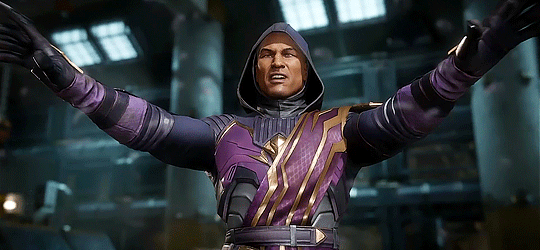
Rain
Doesn't see any contradictions in your status as a Love Goddess and your hobbies. You're a god, who's dating a (very handsome and powerful) god, and you drink and gamble, nothing wrong there. In fact, he enjoys that he can relax around you, you prove that gods can still have fun!
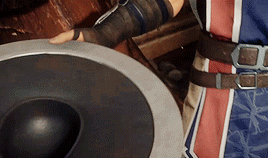
Kung Lao
Thinks he can beat you in drinking and gambling, oh how wrong he is. By the time Lao is facing near-fatal levels of alcohol poisoning on the floor, he comes to understand that deities can't really get drunk, and that he was a fool for underestimating you.
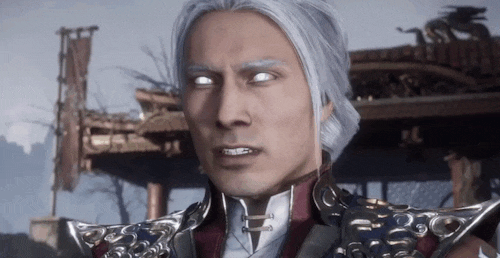
Fujin
Canonically, Fujin also likes to get drunk and gamble, what a match made in heaven! The best part is bringing along your mortal friends on a night out, their drunken antics can keep the two of you entertained for millennia.

Raiden
Respects love as a vital part of life and the human condition but might have an issue with your habits if they affect how others (especially mortals) see him. It doesn't exactly bode well if the guardian of Earthrealm's S/O is out every night cleaning out bars and casinos. He may ask that you rein it back for his sake.

Kuai Liang (Sub Zero)
Is very honoured to be the partner of a Love Goddess, but is concerned by your drinking and gambling. Gambling is not inherently wrong and is actually a popular hobby throughout most of the Chinese diaspora, but drinking and gambling is what he has a problem with. Alcohol isn't a great habit for anyone to have, and he thinks as a god you should show a better example.

Hanzo Hasashi (Scorpion)
The Japanese culturally link alcohol consumption to success, so he has no problem with your drinking. However, gambling is a different story. Being an immortal deity does give you an unfair advantage, and Hanzo doesn't like that you can so easily strip mortals of all their life savings, and he'd ask that you only play on low-stakes bets.
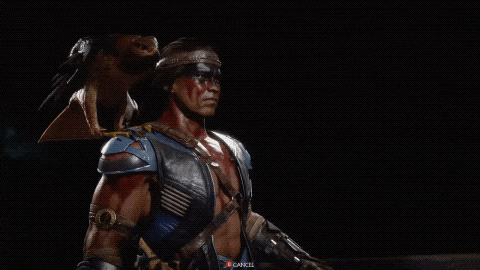
Grey Cloud (Nightwolf)
The Native American community isn't fond of being linked to gambling and alcohol. Knowing your loving nature, Grey will educate you on the dark history Native Americans share with European alcohol and why so many casinos are built on reservations. He's hoping that your love for him will make you rethink your habits and how they've negatively impacted his community.
#mortal kombat#mortal kombat x reader#mortal kombat headcanons#mortal kombat imagines#mk x reader#rain#rain x reader#kung lao#kung lao x reader#fujin#fujin x reader#raiden#raiden x reader#kuai liang#kuai liang x reader#sub zero#sub zero x reader#hanzo hasashi#hanzo hasashi x reader#scorpion#scorpion x reader#grey cloud#grey cloud x reader#nightwolf#nightwolf x reader#qdbs writing
521 notes
·
View notes
Note
Hello! When in the novel it sometimes says that Wei Wuxian's eyes are red do they mean crying-red or literally red like in the donghua? Is there a way to call the two differently in Chinese? Or is it like English and "red eyes" can just mean both?
I like the thought of wwx just being emotional because of everything more than the demonic red eyes from the animation (even tho it's cool I'm not gonna lie!) but what's the canon meaning? I hope you don't mind me bothering you with this
(I hope I worded the question right I'm not a native speaker sorry!)
Btw hope you're doing well! Have a good day!
(Flops in like a dying fish)
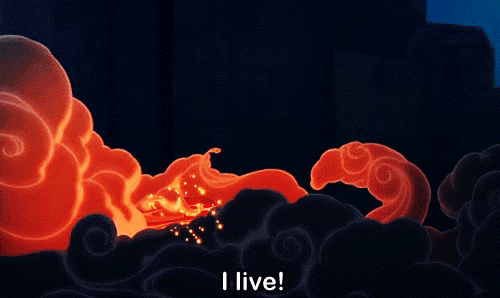
Hello there, anon!
It does indeed mean his eyes are turning red as in about to cry/bright with emotion!
Chapter 99
魏无羡喉咙干哑,眼眶发红,说不出一个字。
Wei Wuxian's throat went dry and mute, his eyes were red, and he couldn't say a word.
发红, fā hóng- to turn red (lit) or to blush/flush. Fā in particular is to show (one's feeling).
So each time you see this it's to say he is overcome enough with emotion (anger, disbelief, etc) that he is indeed on the verge of tearing up. No, his eyes are not in fact flashing red as the Donghua visually loves (it's just a cooler medium to use to express the sentiment of angry red eyes).
I must say I myself am an angry crier... and my feelings come out of my eyes especially when I'm upset/angry lol.
#mdzs#mo dao zu shi#wei wuxian#Xiao Zhan did understand the sentiment but the CQL script went a bit too far into constant angry crying Wei Wuxian
109 notes
·
View notes
Text
the atla universe if languages existed
hey there! ever wondered what avatar would be like if the nations actually spoke different languages? me too! here's my idea of how it would go:
(set during avatar: the last airbender, might add more during korra times another day)
quick disclaimer: i am an american who speaks american english and conversational france french. all of my language knowledge comes from youtube or school. this is just a silly little headcanon i needed to write down.
WATER
Within the water tribe’s language system, there are two main languages: Northern Water and Southern Water. Northern Water is spoken by the Northern Water tribe and Southern Water is spoken by the Southern Water tribe. Despite having similar names, the two languages are very different. When the Water tribes lived as one on the water lionturtle, they all spoke the same language (which we will call Olde Water), but after separation, they evolved independently. Think of the relationships between the two water languages as the relationship between French and Spanish. Their words can be similar (sol/soleil, luna/lune) because they share roots from Latin (or in this case, Olde Water). Northern Water and Southern Water share roots to the point where a Southern speaker and a Northern speaker would not be able to understand each other but could probably pick out a few key words from their speech. Similar words are things that are native to their area, while less common things that did not exist/were unknown during Olde Water times have differing words (the word for “polarbear-dog” is probably similar in both languages, but the word for “badgermole” is probably different). If the tribes met often for peace/community reasons (perhaps annually), then both languages would contain loanwords from the other tribe. For example, if sea prunes are a Southern Water tribe staple, then the word for “sea prunes” in the North is probably the same as it is in the South. Neither language has any sort of written component- it is completely oral.
Another, more niche language also exists within the Water language family, and that is Foggy Swamp. This language also originates from Olde Water, but has a great amount of Earth influence, since the swamp itself is in the Earth Kingdom (influence specifically from Omashu). Someone who speaks Olde Water would understand Foggy Swamp to the extent that someone who speaks American English would understand Pidgin English (that is, they would have to focus intently and would be able to get the jist of their speech). A Northern Water or Southern Water speaker would not be able to understand them at all, since their languages have developed so drastically from Olde Water. However, one could trace roots of words in Foggy Swamp back to Northern or Southern Water. An Earth speaker would not understand them at all either, but would be able to trace back loanwords and modern terminology (the word for “swamp” or “cat-gator”, for example, would be a lot more similar to Earth than it would be to Northern Water or Southern Water). Foggy Swamp also does not have a writing system.
EARTH
Because it covers such a vast space, the people of the Earth kingdom used to be incredibly linguistically diverse, with almost every city speaking differently than the next. During Kyoshi’s reign, Chin the Conqueror took over most of the kingdom and standardized the writing system (similar to the Qin dynasty in China), and therefore heavily influenced spoken language in the Earth kingdom. As an after-effect, Common Earth, also known as simply Earth, is the most widely spoken language in the world, to a similar extent as English or Mandarin Chinese. It is taught as a second language in every nation and it is hard to find a city where there are no Earth speakers. Everyone in the Earth kingdom speaks or understands Earth. Omashu Earth is an accent that is spoken primarily in the city of Omashu, and has tonal differences from Earth, similar to the difference between New York English and standard American English. Aside from Omashu Earth, the other areas of the Earth kingdom that were taken over by Chin do not have distinct accents. There are some slight variances, especially in the Southern islands between the Air temples, but all speakers of Common Earth can understand each other perfectly. Common Earth has a stable writing system that does not vary.
Despite Chin’s attempt to standardize language within the Earth kingdom, the places he did not conquer held fast to their respective languages. Ba Sing Se Earth, which can also be called Upper Ba Sing Se Earth, is the language that differs the most from Common Earth due to Ba Sing Se’s impenetrable walls cutting them off from the rest of the kingdom. Since both languages are derived from Olde Earth, they share similar writing systems, but neither language can understand each other (similar to the relationship between Cantonese and Mandarin). The walls between the Upper and Lower ring also created Lower Ba Sing Se Earth, where grammar is more simplified, due to the hasty lifestyle of a lower-class worker. Both Upper and Lower Ba Sing Se Earth speakers can understand each other, but Upper Ba Sing Se speakers might not be able to understand Lower slang. Their writing system is exactly the same. Kyoshi Earth is spoken solely on Kyoshi island, and is very similar to the former language of the people of Yokoya. It is not understandable to any other Earth speakers and functions similarly to the relationship between Japanese and Mandarin Chinese, with a different yet similar alphabet to Common Earth. The Si Wong tribes, who inhabit the Si Wong desert, speak various independent languages, but are collectively known as Si Wong Earth. Their languages have many loanwords from Common Earth due to trade. Their written language is syllabic and simple, similar to Cuneiform.
FIRE
Most of the Fire nation speaks the same language, but there are three main dialects within the Fire Nation language system. The most commonly spoken dialect is aptly named Fire, but is also known as Common Fire. This language is spoken within the Fire nation capital, Caldera, but is mainly used within the greater land mass of the Fire nation. It evolved from Olde Fire and is the most basic form of Fire nation speech. The most similar dialect is more of an accent with some different slang terms and is known as High Fire. It is spoken by the citizens of Caldera, especially the nobles. It is completely understandable to those who know Common Fire and vice versa. The relationship between the two languages is similar to the relationship between Canadian French and Quebecois. The main difference between High Fire and Common fire is pronunciation of words and tonal patterns within sentences and phrases. The last dialects all get looped into one group and are collectively known as Provincial Fire. Provincial Fire is spoken on the outskirts of the mainland and into the chain of islands off of the Fire nation. It varies greatly depending on what island or area of the mainland it is spoken in and has differences from Common Fire that are similar to Korean’s differences from its provincial dialects (speech pattern and tones, different slang terms). The further out one gets from Caldera, the stronger the dialect. Written language within the Fire nation is the same across all of the dialects and characters are similar to Mandarin Chinese as they are pictorial and syllabic (from canon).
The Sun Warriors are the only ethnic group of the Fire nation that speaks anything other than Common Fire. The Sun Warriors speak Sun Fire, which originates from Olde Fire as well, but has changed greatly since it was spoken within such a small group of people. Someone who speaks Common Fire would not understand Sun Fire at all, but could probably pick out a few words that have similar roots to Common Fire. Sun Fire has two written languages- one is reserved for spiritual leaders and spiritual texts, while the other is used by all people. Visually, it is similar to the differences between Japanese’s Kanji and Kana writing systems, where one is more simplified and one is more traditional. Spiritual written Sun Fire is more similar to written Common Fire.
AIR
The people of the Air nation only have one language: Air. Due to a high need of proper communication, as well as people constantly moving from temple to temple, or growing up at one and working at the other, Air nomads developed only a single language from Olde Air. Air nomads have a robust writing system to allow writing of incredibly complex ideas and air nomad journeys. Most nomads learn multiple other languages as they age, so they can succeed no matter where they find themselves in the world. Due to the destruction of the Air temples, Air is almost a completely lost language. Remaining speakers include Aang and his children, as well as a few Earth kingdom elders who learned the language from friends and passed it down to their children.
MISC.
Cities born out of the 100-year war, like Cranefish Town (Republic City), are another story. The Fire nation mandated that all colonies only speak Common Fire in hopes of destroying the culture of the city, but despite that, a hybrid language developed: Earthen Fire. To a non-speaker, Earthen Fire sounds like Common Fire, but the grammar structure is very Earth based (a Fire speaker can understand Earthen Fire in the way that a Dutch speaker can understand Afrikaans). It also incorporates many loanwords from Earth. The writing system involves the exact same characters as written Earth, so it almost sounds like Fire spoken with an Earth accent.
#atla#avatar#i hope someone actually reads this rant#avatar the last airbender#aang#sokka#katara#zuko#toph#suki#fire nation#water tribe#air nomads#earth kingdom#air temple#the legend of korra#tlok#korra#languages#etymology#polyglot#langblr#linguistics#worldbuilding#headcanon#atla headcanons#avatar headcanons#mega.exe#avatar languages#atla languages
326 notes
·
View notes
Text
I’m curious about everyone’s Chinese language abilities here in the MCL / 莲花楼 fandom:
(Note: unless otherwise specified, “Chinese” refers to all Chinese languages: mandarin, cantonese, hokkien, hakka, teochew, etc.)
124 notes
·
View notes
Text
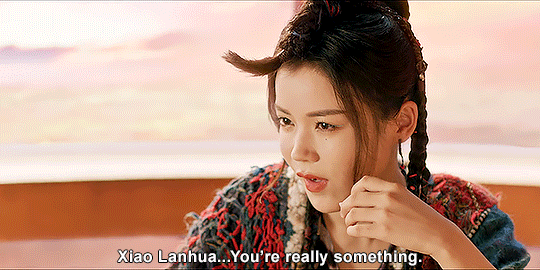
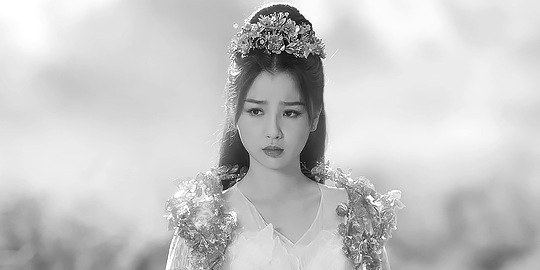
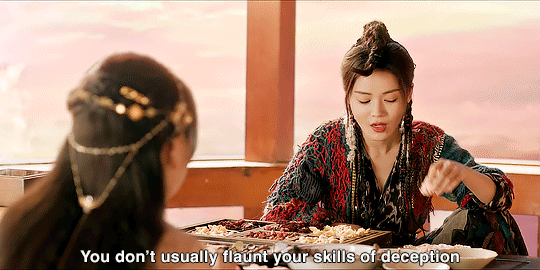

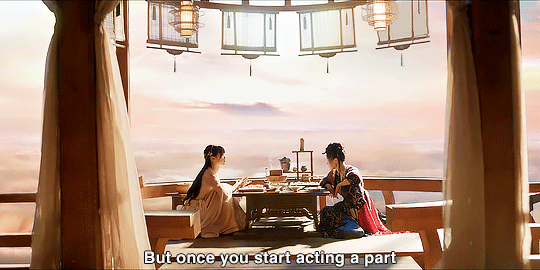
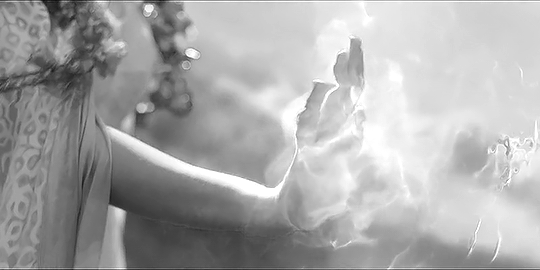
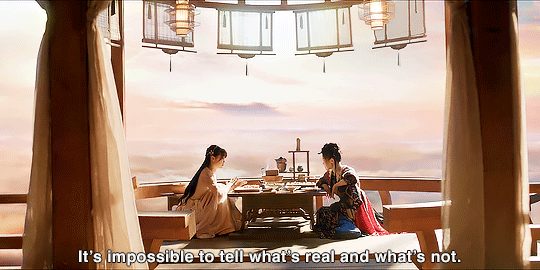

It's the pinnacle of artistry.
Full dialogue and translation notes below the cut.
This bit is translated in Netflix as
Jieli: Orchid…
Jieli: You're really something. I thought I was a good liar. You don't usually show it, but I didn't expect you to be so good at acting.
The Chinese subs:
结黎:小兰花啊,小兰花,可真有你的。
小兰花:啊?
结黎:我自以为骗术高明,可没想到,你平时不显山,不露水的,一旦演起戏来,简直真假莫辨、出神入化
IMO the Netflix subs gloss over how mordant and pithy Jieli's words are. My own translation follows line-by-line.
结黎:小兰花啊,小兰花,可真有你的。
Jieli: Xiao Lanhua, oh, Xiao Lanhua. Really props to you.
小兰花:啊?
Xiao Lanhua: Ah?
结黎:我自以为骗术高明,可没想到
Jieli: I thought my skills of deception were of the highest order, but I didn't imagine that
你平时不显山,不露水的,一旦演起戏来
You don't really flaunt your abilities, but once you start acting
简直真假莫辨、出神入化
It's impossible to tell real from false, the pinnacle of artistry.
Edit to say: I am not a native speaker by any means, and would welcome any corrections or discussion!
#love between fairy and devil#lbfad#clj#xiao lanhua#circ gifs#jieli#T_T#clj language meta#lbfadedit#cdramaedit
286 notes
·
View notes
Text
Love Senior's started airing!!
So here I am, once again, with my usual language observations.
Note: I'm going off the YT subs and shall use whatever name romanizations they use there!
Disclaimer: not a native Thai speaker, still learning 🙏
Manaow's older brother Faung's nickname for her because Siblings™
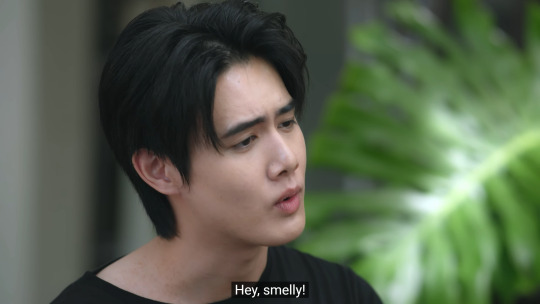
Faung เฟือง /Feuuang/ is shortened from มะเฟือง /Ma Feuuang/ = star fruit
Manaow มะนาว /Ma Nao/ = lime
( ไอ้)หมาเน่า /(ai) maa nao/ = (You) rotten dog
-> as you can see from my basic-ass pronunciation guide, it sounds close to her actual name
-> หมาหัวเน่า /maa huaa nao/, lit. rotten-headed dog, is an idiomatic expression for an outcast, someone who's disliked and has no friends - lol thanks P'Faung!
Gyoza's red Vespa


it's called (เจ้า)หมูแดง /(jao) moo daaeng/
เจ้า /jao/ = used affectionately as a prefix by seniors for children or juniors, as well as by owners for pets
หมูแดง /moo daaeng/ = lit. red pork; grilled marinated pork dish of Chinese origin
What to call each other
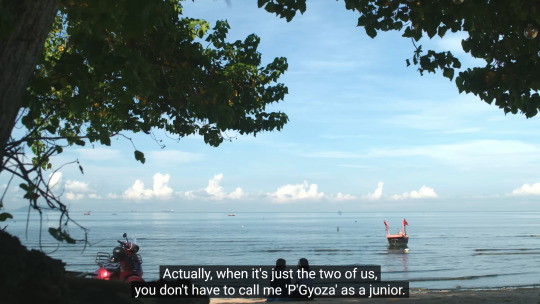
จริง ๆ ตอนเราอยู่กันสองคน นาวไม่ต้องเรียกเกี๊ยวว่าพี่ก็ได้นะ
/jing jing dtaawn rao yoo gan saawng khon, Nao mai dtawng riiak Giao waa Phi gor dai na/
Gyoza, who's been calling herself พี่ /Phi/ and who Manaow has been referring to as พี่เกี๊ยว /Phi Giao/ (because she's a senior a year ahead of her), suggests that when it's just the two of them, Nao doesn't have to call her พี่ /Phi/, and starts referring to herself just by name, เกี๊ยว /Giao/ (her full name Gyoza is เกี๊ยวซ่า /Giao Saa/).


Manaow: งั้นเกี๊ยวเกิดเดือนไรอ่ะ /ngan Giao geert deuuan rai a/
So Manaow drops the พี่ /Phi/ right away and starts calling her เกี๊ยว /Giao/.
And just for completeness's sake: Manaow also refers to herself by name (นาว /Nao/) and Gyoza does so reciprocally (mostly นาว /Nao/ and sometimes มะนาว /Ma Nao/). So no pronouns, just names!


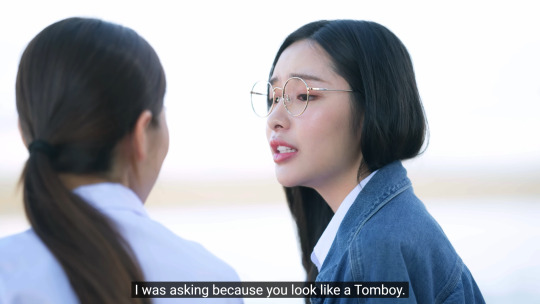
จีบ /jeep/ = pursue, court, flirt with
(Funnily enough, a homonym of เกี๊ยว /Giao/, which means dumpling, is เกี้ยว /giao/, which also means to flirt, woo, etc. - I'll be waiting for this pun in a future episode lol)
Gyoza's reasoning for asking is that Manaow seems ห้าว ๆ เกินหญิง /haao haao geern ying/ = bold/daring/fierce for a woman
Kudos to Lada shamelessly flirting with Alee and calling him หนู /noo/ (= lit. mouse)!!

เดี๋ยวพี่เลี้ยงหนูนะ /diao Phi liiang Noo na/
As a 2nd person pronoun it's usually used by someone much older to affectionately refer to a child or someone younger, implying that the person referred to is cute and smol like a mouse, basically. In the same vein it can sound patronizing too, though, especially coming from a stranger or someone who isn't much older.
They're the inverse of the shy younger girl and flirty pursuing older guy trope and I love that!
Sulking~

หายงอนแล้วใช่ไหม /haai ngaawn laaeo chai mai/ = You're not sulking anymore, right?
Just in case any potential reader has never seen a Thai series before this GL: 'Ngon' and 'Ngor', as they're often romanized, are a set of behaviors that are common in close relationships. That can be familial or between friends too but it's certainly most common in a romantic context and as a romance trope.
งอน /ngawn/ = sulking, pouting, acting displeased, huffy, slighted, petulant; can be playful or serious
ง้อ /ngaaw/ = reconcile, make up with; this can be lots of things tbh, i.e. hugging, apologizing, giving sth. to show care like Manaow does here, etc.
Flirty Puns, my beloved!

กินเกี๊ยวไหม /gin giao mai/ = Wanna eat the dumpling?
GIN GIAO MAI DJSDHSDJDSH okay now that that's out of my system-
As we've established, Gyoza refers to herself as เกี๊ยว /Giao/, which means dumpling. And กิน /gin/ means consume, take, exploit, it's mostly used with food and drink though, hence it generally being translated as 'eat'. So:
กินเกี๊ยวไหม /gin Giao mai/ = Wanna eat me?
Sidenote: this specific dumpling here is เกี๊ยวทอด /giao thaawt/ = fried wonton/dumpling
#love senior the series#love senior#พี่ว้ากคะ รักหนูได้มั้ย#thai gl#local woman harps on about linguistics#this show is so fun and tropey! and it's in such high quality resolution!! ... i'm totally not side-eyeing gmmtv here or anything ehem
121 notes
·
View notes
Note
speaking of korean names, i think you got some of them wrong in your preset choices. I'm pretty sure the korean name for sky is haneul, river is kang, and ha is summer/sunshine. now I'm not a korean so i could be wrong but when i did my research when i was trying to search for my mc's name those are what came up for me. i hope i didn't sound rude, i just wanted to help 😅
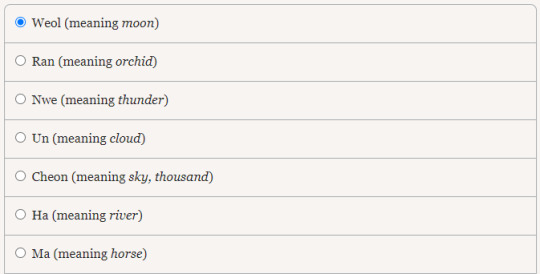
hello hello! i understand why you would think that, and would like to explain a little about why i chose certain names and paired them with certain meanings. now, i would also like to disclose that i am also not korean, but here is the reasoning that i have. if anyone is a native korean speaker, please feel free to correct anything or give additional comments!
and now, buckle up for a history lesson, everyone!
first of all, one thing to know is that for many korean words written above, they have both a hangul (한글) form - korean writing that we often see in modern media - and a hanja (漢字) form - chinese characters that were used as the writing system in korea up to 1443 CE. at that time, hangul was introduced in joseon dynasty korea during the reign of king sejong the great, in an attempt to make written literacy more available to the common people.
hence, when looking at the meaning of the words above, one must first know the hanja character that the hangul pronounciation refers to. many words with the same hangul can have the different meaning. their corresponding hanja, however, can be completely different!
let me explain this with some of the words that you have brought up.
while kang 강 does indeed mean river, its corresponding hanja has a variety of characters: 姜, 康, 強, 江, 剛, 㝩. the first is 姜, which is most common, and actually means ginger. the kang that corresponds with "river" is actually the fourth character, 江.
however, there is another hanja with a different hangul that is also translated to "river", but is used in different situations. that is ha, which i assume is the one that you think is wrong.
ha also has a number of corresponding hanja, but i'll only put the relevant ones here: 河 and 夏. both are read as ha in korean hangul, but the first means "river" while the second means "summer". in mandarin chinese, they are read as "hé" and "xià" respectively.
the last one, cheon 천, has three corresponding hanja characters - 千, 天, 川. 千 means thousand, 天 means sky and 川 also means... drumroll noises... river.
so, i hope this has helped you understand this a little better! and for everyone who stuck around until the end, here's a very pleasant 💓and 🍪 for you!
61 notes
·
View notes
Text
Poll Below
So, I saw someone say yesterday that "most people skim watch Chinese dramas", and that honestly blew my mind. If it has subtitles, I have to watch it and focus on it.
But then several thoughts occurred to me. You see, right now, my friend and I are watching The Longest Promise and The Screen Foxes. To us, The Longest Promise is painfully slow. We thought it was a little slower than most Chinese dramas, but most Chinese dramas are a little bit slow, and The Longest Promise actually feels much slower to us because we hate the main character and, like, half the story decisions so much, we thought. (Sorry, no offense to Longest Promise fans.) We thought that if we actually liked the main character and were invested in her story, the way the show dilly-dallied on every one of her scenes - having her say the same things over and over again, showing a dozen different angles on some magical moment in her life, having her express feelings about something that happened in a previous episode that she had made very clear at the time - would be enjoyable. Meanwhile, before we started The Screen Foxes, I read three different reviews that said the plot moved lightning-fast, bounced all over the place, and didn't make any sense. And ... none of that is true (so far). The plot moves at a normal pace. A thing happens, and then, something else happens as a consequence. There ARE several different interconnected story threads, and we do bounce back and forth between them, but it all makes sense. And last night, it hit me that maybe The Longest Promise is so slow because you're supposed to "skim watch" it. Certainly, if you dip in and out, you can follow the plot very easily. Scenes are long enough that it's hard to miss a whole one if you're checking back in frequently, repetitive enough that you can understand the point of the scene even if you miss three-quarters of it, and the same points are repeated in multiple scenes, so there are very few details you can miss even if you don't watch it too closely. (Plus, the plot is predictable enough that it's easy to follow.) Meanwhile, because The Screen Foxes doesn't dawdle on any points, if you're not actually sitting down and watching, it must seem chaotic and nonsensical. Why are they fighting this green monster now? Wasn't the show about painting a minute ago? The green monster is being used by a Taoist to body-guard a rich family. The Taoist is actually the one who made the family rich. Why? That's the mystery we need to find out. In the meantime, this family used its wealth to cheat in the painting contest from the last episode, so fighting their body guard is advancing that painting plotline too. But if you looked away from the screen during the two minutes where they were explaining all that, then yeah, it would be super confusing why this show just went from a painting contest to a demon fight.
If Chinese dramas are MEANT to be watched in the background, and that's the reason so many of them are so long and slow, then, honestly, my whole worldview has been changed.
So, TLDR: I have to know now: DO most people actually "skim watch" Chinese dramas????
#P.S. I will have more to say about The Screen Foxes when I finish it probably.#Also the fast-forward option is here because I saw someone say something about that in a post a few months ago.#Also having it on in the background would explain how my Chinese friend - who had a kid and a full-time job - could find time to watch mor#C-dramas than me. It just never crossed my mind because since I don't speak Chinese it would never occur to me to not sit down and focus on#the show.#poll#original#The Screen Foxes#The Longest Promise#The Untamed#Word of Honor#Till the End of the Moon#Love Between Fairy and Devil#Legend of Fei#The Oath of Love#<- Just some C-dramas I was thinking about as I typed all this.
62 notes
·
View notes
Text
What's in the name: Cloud Recesses
While making the edits for the post about the seats of the five great sects (plus one small definitely-not-a-sect), I found myself going "Why do the Lan always have to be so extra, why not just stick to three characters like everyone else 😫". But looking at the characters used for what is simply translated as "Cloud Recesses" is actually very interesting. Let's see!

My trusty translation software translates the 云深不知处, yúnshēn bùzhīchù, as "the clouds are deep and unknown" with the 云深, yúnshēn, translated as "Cloud Deep" and the 不知处, bùzhīchù, translated as "I don't know where (something is situated)". So, together they evoke "a place hidden by deep clouds" (hidden in deep clouds), the "Cloud Recesses".

But looking at the characters in more detail, more layers of meaning emerge. In addition to "not knowing" or "being unaware" of something, the characters 不知, bùzhī, carry the figurative meaning of "to not admit defeat, hardships, tiredness etc." (or so my trusty dictionary says). The character 处, chù, means "a place" but also, when pronouced/read as chǔ, "to dwell". So, put together, "to dwell (in) a place hidden by deep clouds, admitting no defeat, hardships, tiredness etc."? Sounds pretty Lan, if you ask me (and, as a sidenote, the chǔ also has a meaning "to punish"... just saying).

And there's more. In addition to the "cloud", the character 云, yún, is mentioned to have a literary meaning of "to say, speak", and the character 深, shēn, can also mean "profound". Can that be taken to mean "profound speech" or "to speak profoundly"? As in speaking with great knowledge, showing wisdom and insight, speaking philosophically, or speaking intensely, acutely, with deeply felt words... I might be reaching here but it feels intentional, as speech is something that seems to define the Lan with their silencing spells and all their rules related to speaking. And come to think of it, "speaking profoundly" seems to also define all the main Lan, in one way or another: Lan Qiren, the respected teacher; Lan Xichen, the soft-spoken diplomat; Lan Wangji, who does not speak unless there is something really worth saying, and when he does, speaks almost exclusively in elevated register (a great meta post about that by @hunxi-guilai); Lan Sizhui, speaking for Lan Wangji and speaking with manners and wisdom beyond his years; Lan Jingyi... speaking, and speaking with passion, not afraid to voice his opinions.

So, it seems to me that the name of the seat of the Lan Clan is layered with meanings beyond the "Cloud Recesses", meanings that cannot be expressed in a simple translation, but that actually also describe the Lan, not just the place they live in.
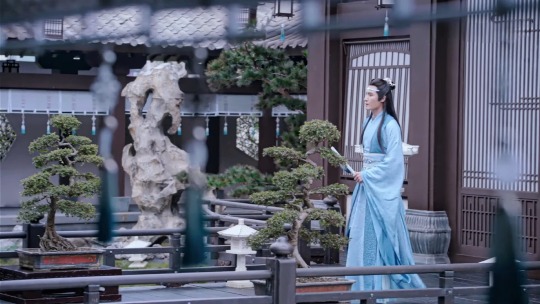
However, I need to end this with a disclaimer: as much as I would love to, I do not speak (or know much) Chinese, so as I mentioned I am relying on translation software and dictionaries here, and my speculations may be all wrong. So I would love to hear from native Chinese speakers, or from people who actually know the language, if anything I've mentioned above makes any actual sense or if I'm reading way too much into this 🙂.
#cloud recesses#gusu lan#the meaning of 云深不知处#the untamed#theuntameddaily#cql#mo dao zu shi#mdzs#meta#or perhaps rather speculation#random late night thoughts#mine#korpikorppi
102 notes
·
View notes